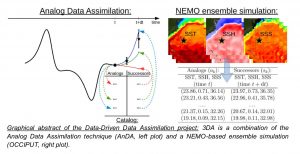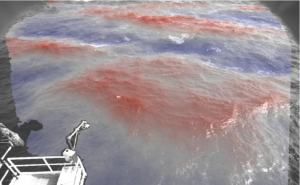DATA-DRIVEN DATA ASSIMILATION
PI and organization: Pierre Tandéo (IMT Atlantique)
Co-Is: Ronan Fablet (IMT Atlantique), Stéphanie Leroux (Ocean Next)
External experts: Thierry Penduff (IGE), Julien Le Sommer (IGE), Jacques Verron (Ocean Next), Bertrand Chapron (IFREMER), Pierre Ailliot (IMT Atlantique), Cédric Herzet (IMT Atlantique)
Abstract: Nowadays, oceanic and atmospheric sciences face a deluge of data pouring from space, is situ monitoring and numerical simulations. The availability of these different data sources offer opportunities, still largely underexploited, to improve the understanding, modelling and reconstruction of geophysical dynamics. Classically, we use data assimilation methods to reconstruct the space time dynamics from noisy and partial observations. In practice, this requires simulations based on explicit dynamical models with large computational costs, and with possible limitations such as inconsistencies between the model and the observed data, and substantial modelling uncertainties. Recently, authors proposed an alternative data assimilation approach, using representative catalog of historical data: the analog data assimilation (AnDA) method is used to learn the local relationships between state variables and provide realistic forecast from the analog method, without online evaluation of a physical model. In this proposal, we propose to investigate AnDA using an historical database of a NEMO-based 50 member ensemble simulation (hereinafter called OCCIPUT) in order to interpolate satellite observations of sea surface temperature, salinity and altimetry. The proposed method thus be seen as an optimal interpolation with a physically-constrained covariance structure. The main goal is to demonstrate the relevance of data-driven strategies to improve satellite-derived interpolated products and specially the geostrophic surface currents.
Project highlight at mid-term:


